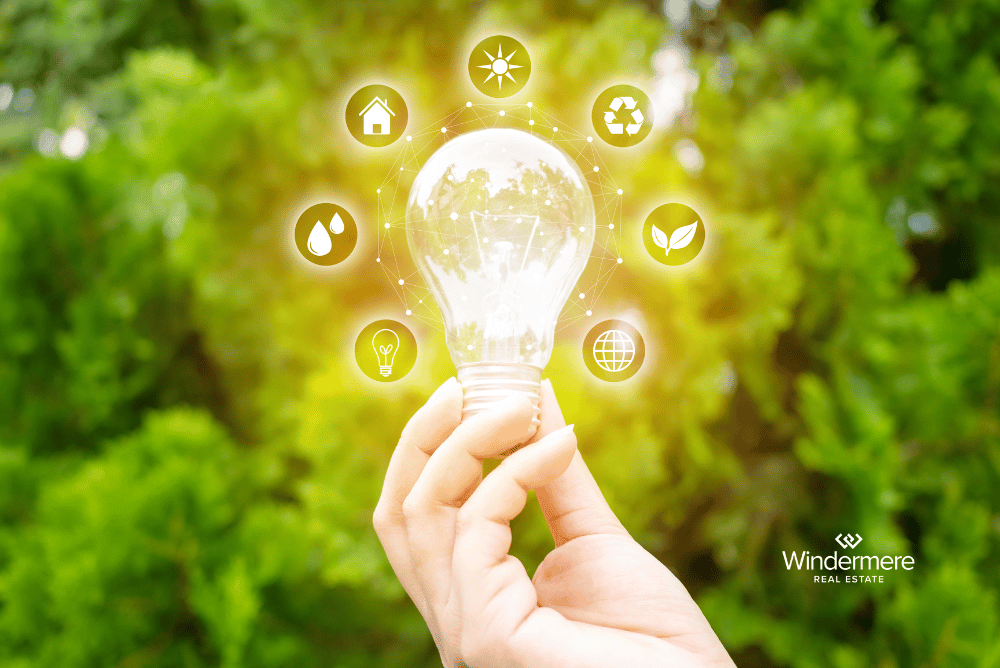Whether you are looking to “go green” or cut down on your monthly utility bills, there are many ways to save energy and reduce water waste in your home. Either way, it feels good to lower your monthly costs by implementing small but impactful changes and taking advantage of the latest innovations. We’ve gathered together some easy options to help you use energy more efficiently and reduce water use.
Participate in PSE Flex
Puget Sound Energy (PSE) offers a PSE Flex program to reduce energy use during peak times. Many customers already receive texts, emails, or calls asking them to reduce energy use during high demand spikes, but if you officially enroll in one of the Flex programs, you will immediately receive rewards. The program has three options, including Flex Rewards, Flex Smart, and Flex EV. You are welcome to participate in one or all three of the Flex programs as long as you meet the qualifying requirements. Flex Rewards is available to all PSE residential customers who have an AMI meter with homes heated and/or cooled by PSE electricity. Flex Smart requires a compatible smart thermostat, and Flex EV requires a qualifying electric vehicle. It’s easy to sign up and start saving.
Unplug Appliances
Many appliances look lifeless when not in use, but the truth is they are still drawing power even when turned completely off. Unplugging and then plugging back in every appliance is a pain. Instead, use a power strip to make this whole process easy. Simply plug your television, DVD player, streaming device, game console, microwave, coffee maker, etc. into a power strip. Then turn the power strip off when the appliances aren’t in use. There are also a number of smart plugs and power strips available that do this for you so you don’t have to worry about it.
Use Energy Efficient Lighting
If you haven’t already, switch all your indoor and outdoor light bulbs to LED options. LEDs use up to 90% less energy and last up to 25 times longer than incandescent light bulbs. To ensure you are using the most efficient LED bulbs, look for the Energy Star label on the box. This indicates that the light bulbs are approved by the U.S. Environmental Protection Agency (EPA).
In addition to switching bulbs, install a smart timer to operate your outdoor lighting. This will ensure that your outdoor lights are on only when needed most. Many also have timer options of two, four, six or eight hours. This is another great option if you feel comfortable without having outdoor lights on the entire night. And, of course, when you’re inside, turn off the lights when you leave a room. All these small actions can add up to big savings.
Install Energy Star Appliances
The next time you are in the market for a refrigerator, television, or furnace, look for the Energy Star label as well. Energy Star appliances use less electricity and water and can help you save on both bills. Refrigerators with the Energy Star label are at least 15% more efficient than the minimum federal standard. An Energy Star dishwasher saves about 3,850 gallons of water over its lifetime – that’s a lot of water! This conservation of energy and water means reducing your costs even more over time. For more water-saving appliances and devices, look for the EPA’s WaterSense label.
Capture and Use Excess Water
In many instances, each time we use water, there are opportunities to capture it for secondary uses. For example, in many homes, it takes a while for the shower to heat up before it’s ready. Instead of letting all this water go down the drain, capture it with a bucket for other needs. This scenario also applies in the kitchen when washing fruits and vegetables. Excess water from the shower and the kitchen can be used for watering indoor and outdoor plants.
Collect Rainwater
Make the most of our wet weather by collecting rainwater for use in your yard. By collecting rainwater, you are reducing the amount of stormwater and pollution that flows to the ocean and reducing the amount of drinkable water that is wasted on outdoor watering. Plus, this is another great way to reduce your water bill. The best strategy is setting up a rain barrel to collect water runoff from your gutters. Washington State does have policies on how collected rainwater can be used, so be sure to review them in advance. Overall, homeowners are allowed to collect rainwater for use on their property but not for drinking water due to safety concerns.
If you are interested in diving into more ways to save energy and reduce water waste at home, check out these smart products and additional conservation measures.

 Facebook
Facebook
 X
X
 Pinterest
Pinterest
 Copy Link
Copy Link
